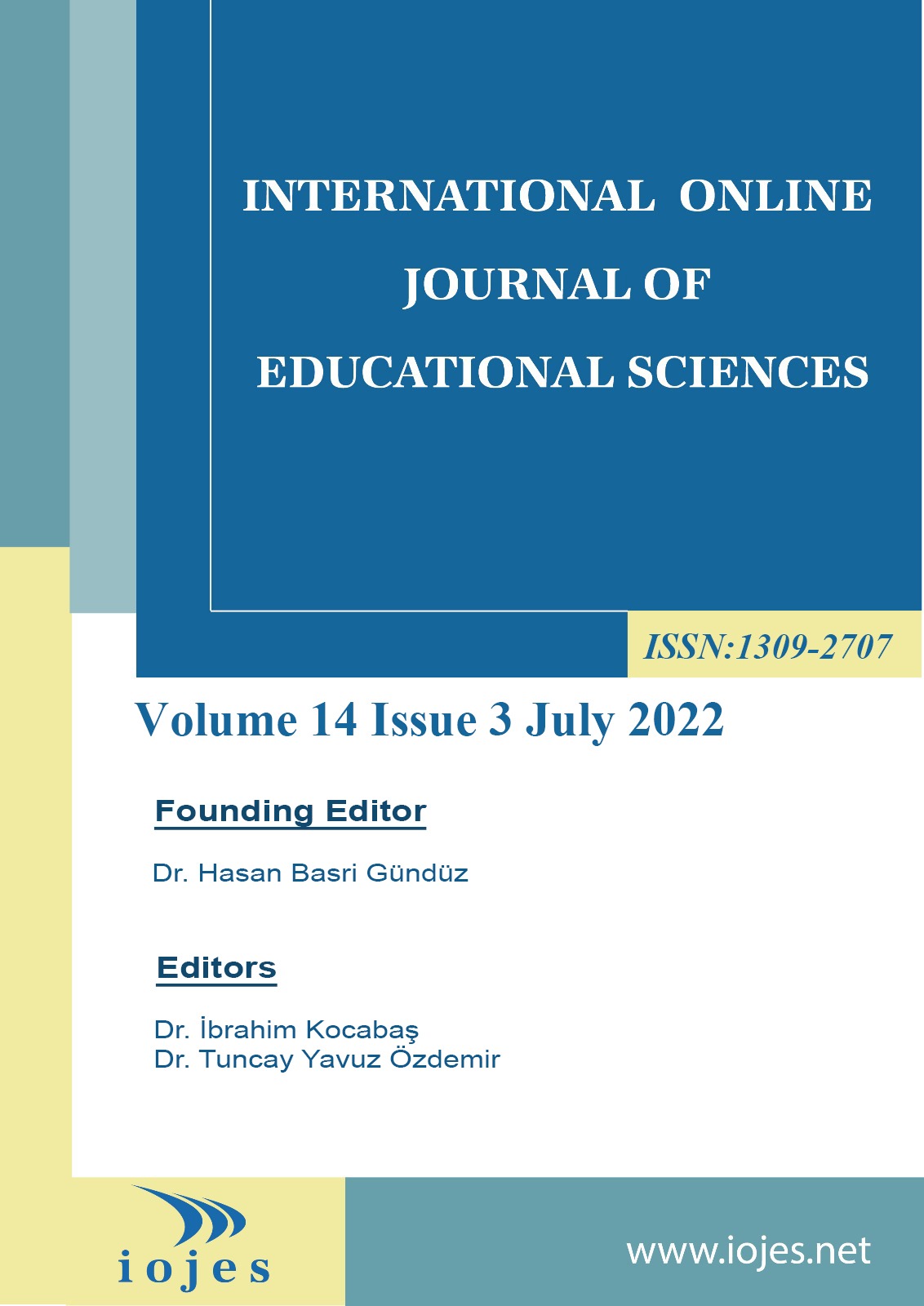A Study Into the Effect of the Educational Program to Support the Emotional Development of Children on Mothers
Author :
Abstract
Keywords
Abstract
The purpose of the current study is to investigate the effect of the educational program applied on mothers to support the emotional development of their children on mothers’ coping with the negative emotions of mothers. The study was carried out through pre-test, post-test, retention test and control-grouped experimental design. In the study, The Educational Program to Support the Emotional Development of Children was applied on the mothers in the test group for 13 weeks as one a week for 90 minutes. In the evaluation the efficiency and retention of the Education Program over test group, Coping with Negative Emotions Scale was used. In the analysis of data, t test was used for Split-plot Two Factor ANOVA, Paired Samples and Repeated Measures. As a conclusion, it was found that the education given to mothers made positive support to the behaviours of mothers in coping with the negative emotions of their children.
Keywords
- Altan, Ö. (2006). The effects of maternal socialization and temperament on children’s emotion regulation. (Yayınlanmamış Yüksek Lisans Tezi). Koç Üniversitesi, İstanbul.
- Büyüköztürk, Ş. (2011). Sosyal Bilimleri İçin Veri Analizi El Kitabı. Ankara: Pegem.
- Büyüköztürk, Ş., Çakmak Kılıç E., Akgün, Ö.E., Karadeniz, Ş. & Demirel, F. (2012). Bilimsel Araştırma Yöntemleri. Ankara: Pegem.
- Caulfield, R. A. (2001). Infants and toddlers. The United States of America: Prentice Hall.
- Çağdaş, A., Arslan, E., Erbay, F. & Orçan, M. (2010). Etkili Annelik Eğitim Programının Annelerin Benlik Saygısına ve Anne Çocuk İlişkisine Etkisinin İncelenmesi. Değerler Eğitimi Dergisi, 8(20), 7-23.
- Çeçen, A. R. (2002). Duyguları yönetme becerileri eğitimi programının öğretmen adaylarının duyguları yönetme becerileri üzerindeki etkisi. (Yayınlanmamış doktora tezi), Çukurova Üniversitesi Sosyal Bilimler Enstitüsü, Adana.
- Denham, S. A., Mitchell-Copeland, J., Strandberg, K., Auerbach, S. & Blair, K. (1997). Parental contributions to preschoolers' emotional competence: Direct and indirect effects. Motivation and Emotion, 21(1), 65-86.
- Denham, S. A. (1998). Emotional Development in Young Children. New York: Guilford.
- Denham, S., Mason, T., Caverly, S., Schmidt, M., Hackney, R., Caswell, C. & DeMulder, E. (2001). Preschoolers at play: Co-socialisers of emotional and social competence. International Journal of Behavioral Development, 25(4), 290–301.
- Denham, S. A. & Kochanoff, A. T. (2002). Parental contributions to preschoolers’ understanding of emotion. Marriage and Family Review, 34, 311-343.
- Eisenberg, N., Fabes, R. A. & Murphy, B. C. (1996). Parents' Reactions to Children's Negative Emotions: Relations to Children's Social Competence and Comforting Behavior. Child Development, 67, 2227-2247.
- Eisenberg, N., Fabes, R. A. & Losoya, S. (1997). Emotional Responding: Regulation, Social Correlates and Socialization. Peter Salovey & David J. Sluyter (Ed.), Emotional Development and Emotional İntelligence (pp.129-163). New York: BasicBooks.
- Eisenberg N., Cumberland A. & Spinrad T. L (1998) Parental socialization of emotion. Psychological Inquiry, 9(4), 241-273.
- Ellis, P. D. (2010). The Essential Guide to Effect Sizes. New York: Cambridge.
- Fabes, R. A., Leonard, S. A., Kupanoff, K. & Martin, C. L. (2001). Parental coping with children’s negative emotions: Relations with children’s emotional and social responding. Child Development, 72(3), 907– 920.
- Güven, E. (2013). Çocuğun davranış sorunları ile algıladığı anne baba çatışması arasındaki ilişkiler: duygu sosyalleştirmenin aracı rolü. (Yayınlanmamış yüksek lisans tezi), Ankara Üniversitesi Sosyal Bilimler Enstitüsü, Ankara.
- Havighurst, S. S., Harley, A. & Prior, M. (2004). Building Preschool Children’s Emotional Competence: A parenting Program. Early Education & Development, 15(4), 423-447.
- İnce & Ersay (2022). Okul Öncesi Dönem Çocuğuna Sahip Anne ve Babaların Duygu Sosyalleştirme Davranışlarının İncelenmesi. Gelişim ve Psikoloji Dergisi, 3 (5), 1-17.
- Kağıtçıbaşı, Ç. (1998). Kültürel Psikoloji: Kültür Bağlamında İnsan ve Aile (Çev. Çiğdem Kağıtçıbaşı , Ayşe Üskül, Esin Uzun). İstanbul: Yapı ve Kredi Kültür Sanat
- Kaptan, S. (1998). Bilimsel Araştırma ve İstatistik Teknikleri. Ankara: Tekışık.
- Köse, E. (2010). Bilimsel Araştırma Modelleri. Remzi Y. Kıncal (Ed.), Bilimsel Araştırma Yöntemleri (pp.97- 120). Ankara: Nobel.
- O’Hagan, M. & Smith, M. (2004). Early Years Child Care & Education: Key Issues. Edinburgh: Bailliere Tindall.
- Onur, B. (2004). Çocuk ve Ergen Gelişimi. Ankara: İmge.
- Öğretir (2004). Pozitif düşünmeye dayalı grup eğitimi programının annelerin benlik algısı, eşlerine ve çocuklarına yönelik tutumları ile kendini denetleme becerisi ve otomatik düşünceleri üzerinde etkisi. (Yayınlanmamış doktora tezi), Ankara Üniversitesi Eğitim Bilimleri Enstitüsü, Ankara.
- Ömeroğlu, E., Kurtulmuş, Z. & Yayla, Ş. (2004, Haziran-Temmuz). Aile Çocuk Eğitim Programının Aile Yapısı, İşleyişi ve Kaygı Düzeyine Etkisinin İncelenmesi. I. Uluslararası Okul Öncesi Eğitim Kongresi’nde sunulmuş bildiri, Marmara Üniversitesi, İstanbul.
- Özbay, Y. (2004). Gelişim ve Öğrenme Psikolojisi (Kuram-Araştırma-Uygulama). Ankara: Öğreti.
- Pamukcu, D. (2022). 4-6 yaş çocuğu olan asker babalara ve eşlerine verilen çocukları dikkate almak programının etkililiğinin incelenmesi. (Yayınlanmamış doktora tezi), KTO Karatay Üniversitesi, Lisansüstü Eğitim
- Ramsden, S. R. & Hubbard, J. A. (2002). Family expressiveness and parental emotion coaching: Their role in children’s emotion regulation and aggression. Journal of Abnormal Child Psychology, 30(6), 657–667.
- Ryder, V. (1995). Parents and their children. South Holand: The Goodheart-Willcox.
- Seçer, Z. (2017). Sosyal Olarak Yetkin Okul Öncesi Çocukların Duygu Düzenlemeleri İle Annelerinin Duygu Sosyalleştirme Davranışları Arasındaki İlişkiler. Kastamonu Eğitim Dergisi,25 (4), 1435-1452.
- Southam Gerow M. A. (2014). Çocuklarda ve Ergenlerde Duygusal Düzenleme. (Çev.Murat Artıran; Çev. Edit. Muzaffer Şahin) Ankara: Nobel
- Tekin, N. (2016). Annelere uygulanan çocuklarının duygusal gelişimini desteklemeye yönelik eğitim programının annelerin duygularını yönetmelerine ve çocuklarının olumsuz duyguları ile baş etmelerine etkisinin incelenmesi. (Yayınlanmamış doktora tezi), Gazi Üniversitesi, Eğitim Bilimleri Enstitüsü, Ankara.
- Topal, H. (2021). İlkokul çocuklarına ve annelerine uygulanan duygu düzenleme psikoeğitim programlarının çocukların duygu düzenleme becerilerine etkisi. (Yayınlanmamış doktora tezi), Çukurova Üniversitesi Sosyal Bilimler
- Ülker-Erdem, A. (2019). Duygu sosyalleştirmeye yönelik ebeveyn müdahale programının etkililiği. (Yayınlanmamış doktora tezi), Hacettepe Üniversitesi, Eğitim Bilimleri Enstitüsü, Ankara.
- Yapıcı, Ş. & Yapıcı, M. (2005). Gelişim ve Öğrenme Psikolojisi. Ankara: Anı.
- Yeşilyaprak, B. (Ed.). (2007). Duyguları Fark Etme ve İfade Etme Psiko-Eğitim Programı. Ankara: Nobel.
